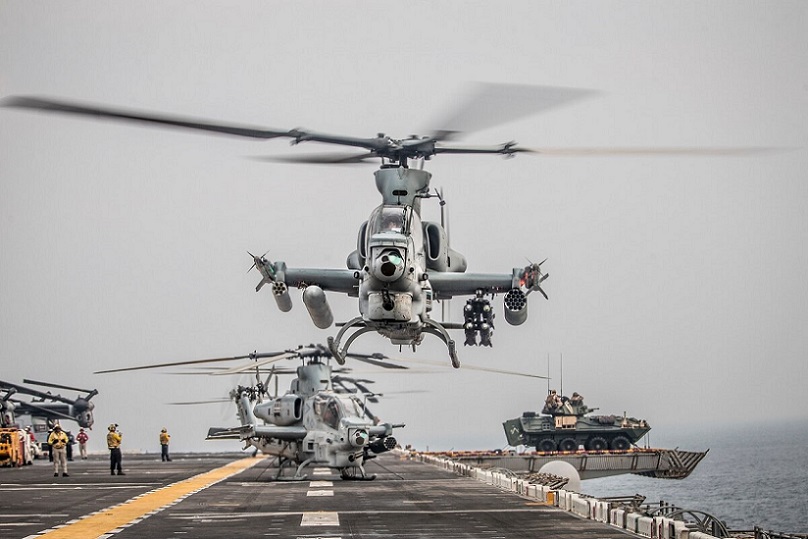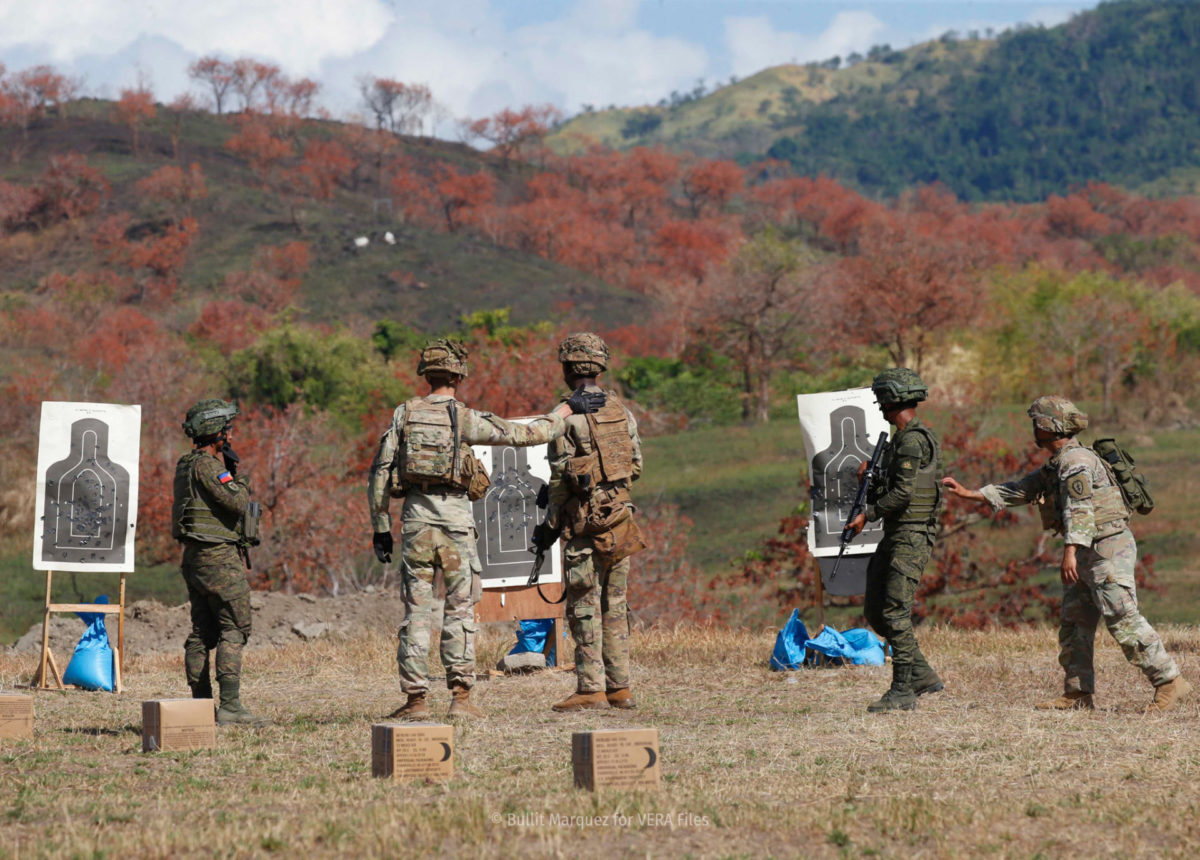Was all of President Duterte’s kicking and cursing about the Visiting Forces Agreement (VFA) in February – to borrow from the Bard –really just all bluster, “told by an idiot/ full of sound and fury,/Signifying nothing”?
The question arose after President Duterte suspended for the time being an earlier notice he had sent to the Trump administration that the Philippines was terminating the country’s VFA with the United States.
Foreign Affairs Secretary Teodoro Locsin Jr announced late Tuesday night the stay on the abrogation of the treaty via a tweet – well, at least, for the next six months.
But the clue lies in the conditional nature of the not-quite complete reversal of policy: per Locsin, the suspension of the process of abrogation took effect on June 1, and “shall continue for 6 months” and may even be extended for an equivalent period.
Under article 9 of the VFA, the notice of termination was to become effective “180 days from the date on which either party gives the other party notice in writing that it desires to terminate the agreement.”
But the big conditional points to a pending purchase by the Philippines of six advanced combat helicopters, which had already been cleared by the US State Department but is being opposed by Philippine and American human rights groups.

An AH-1Z Viper helicopter takes off Aug. 12, 2019, during a Strait of Hormuz transit aboard the amphibious assault ship Boxer. The U.S. State Department has approved the sale of six of this type of helicopter to the Philippines. (Lance Cpl. Dalton S. Swanbeck/U.S. Marine Corps)
The purchase, with a price tag ranging from US $450 million to US $1.5 billion, depending on the helicopter make and model that will eventually be sold, still needs US congressional approval.
And that’s the reason why Mr. Duterte is being segurista. He doesn’t want to fully commit yet to the restoration of the VFA, because he’s leery of what the US Congress will do when the proposed sale is formally presented to it for approval.
“The Philippines is considering either the AH-1Z or the AH-64E to modernize its attack helicopter capabilities,” a note on the website of the US Defense Security Cooperation Agency (DSCA) states, as quoted by Defense News. “The proposed sale will assist the Philippines in developing and maintaining strong self-defense, counterterrorism, and critical infrastructure protection capabilities.”
The DSCA is a US Department of National Defense unit dealing with security cooperation with American allies.
To begin with, the approval by the US State Department should not have happened, given the very reason for Mr. Duterte’s decision to end the VFA – yet another cautionary example of American regional realpolitik. They like to wear the human rights hat when it suits them, but they could just as quickly ditch it in the name of US national interest.
In late January this year, Mr. Duterte exploded in anger over the reported cancellation by the US of the American visa issued to a key ally in his deadly drug war, SenatorRogelio “Bato” Dela Rosa, because of the role he played as chief implementor of Oplan Tokhang when the latter was chief of the Philippine National Police (PNP).
What really angered Mr. Duterte was that the visa cancellation was apparently the consequence of the Asia Reassurance Initiative Act (ARIA), signed by US President Donald Trump in December 2018.
ARIA advances a “Free and Open Indo-Pacific” policy based on national security interest of the United States to promote “human rights and respect for democratic values in the Indo-Pacific region.” The law specifically references the Philippines over “disturbing reports of extrajudicial killings.”
It complements the older Magnitsky Act, a law authorizing the US government to sanction those who it sees as human rights offenders by freezing their assets, and banning them from entering the U.S.
ARIA authorizes the American president to impose “targeted financial penalties and visa ban sanctions, in accordance with applicable law and other relevant authorities, on any individual or entity that–(1) violates human rights or religious freedoms; or (2) engages in censorship activities.”
It specifically provides that the US government may not provide counter-narcotics assistance to the PNP unless the Philippines adopts a strategy “consistent with international human rights standards, including investigating and prosecuting individuals who are credibly alleged to have ordered, committed, or covered up extrajudicial killings and other gross violations of human rights in the conduct of counternarcotics operations.”
ARIA is also tied to the US Asia pivot to contain China’s growing influence in the Asian region, as it authorizes US forces to “conduct, as part of its global Freedom of Navigation Program, regular freedom of navigation, and overflight operations in the Indo-Pacific region, in accordance with applicable international law; and (2) to promote genuine multilateral negotiations to peacefully resolve maritime disputes in the South China Sea, in accordance with applicable international law.”
This makes Mr. Duterte, who has brought the Philippines closer to China more than any other Filipino leader, a prime target of US sanctions under ARIA.
This also explains Mr. Duterte’s decision to go after the VFA, despite protestations from the Philippine defense establishment.
As they say, there’s an opportunity in every crisis.
For the Americans, the hefty price tag that the pending sale of defense articles comes with is only icing on the cake, if it pushes through. After all, it will be the single biggest sale of brand new US defense materiel to the Philippines in recent memory. More than that, it is a chance to re-establish ties with the Philippine military establishment, and even to re-commit the latter into the US regional agenda.
For Mr. Duterte, it’s an opportunity to placate a restive military unhappy with his pro-China policy direction on the South China Sea. It’s also face-saving for him (look, Trump blinked!), even if in reality, he actually fell for the trap laid down by the Americans for Mr. Duterte when they pushed the ARIA button to get him back to talking with them.
For the military, it is only too happy to take any chance it gets to upgrade its puny capabilities (yes, it’s true plenty of them do care about the defense of our national patrimony). Yet it also highlights for its own constituency the key role the military continues to play under the Duterte administration – for or against.
What we don’t know is if a successful sale will mean Senator Dela Rosa will get back his US Visa. Maybe not.
————–
*Romel Regalado Bagares, an alumnus of the University of the Philippines College of Law and the Vrije Universiteit Amsterdam, teaches public international law at Lyceum Philippines University College of Law.He also serves on the Board of the Philippine Society of International Law.

